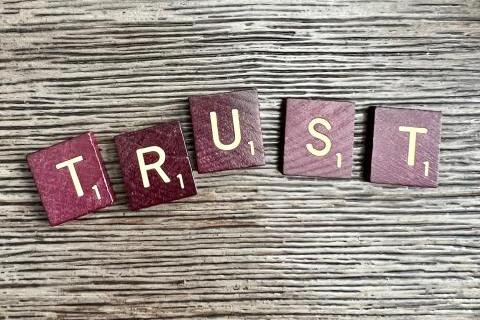Clean Language: Trusting in People’s Inner Wisdom
by Marian Way in Coaching

I’ve written before about trust factors in Clean Language coaching and the importance of trusting that people can and will be able to find their own answers to the questions they bring to coaching, but just because we know this is important doesn’t necessarily make it easy. So how can new coaches gain this trust, and what can they do with all the ideas and bits of advice that come, unbidden, to mind during their coaching sessions?
The Temptation to Offer Advice
What is easy is to offer advice. In everyday conversations with friends, someone will say, “I’ve got a problem with my xxxx,” and almost immediately – often without any questioning at all – someone else will say, “Have you tried yyyy?” It rolls off the tongue:
- How about talking to your boss?
- Have you tried journalling?
- You should go to the doctor about that.
- I’ve read a great book about that.
As human beings, we want to help, to fix and to share our own experiences in the hope that we might guide someone else. And those drawn to coaching and other helping professions are more likely to have what Miller and Rollnick have termed the ‘righting reflex’: a tendency to offer advice rather than explore someone’s intrinsic motivation for change.
Building Trust in the Clean Language Process
When Caitlin or I meet a new group of people, perhaps during a webinar, demonstration or some other event hosted by someone who wants to introduce Clean Language to their own tribe, one participant will often say, “That’s fine here in this group, but it couldn't work with my kids. It couldn't work within our factory. It couldn't work with my people. You'd have to change it to make it work with my people.” They don’t trust that ‘their’ people would be able to respond well to clean questions, or access their own inner wisdom. (Of course, there is a sense in which we are always adapting our way of working with clean questions to make them effective for each individual, but this is nuanced and not needed to get started.)
So even getting started requires some trust. Some people may have gained their trust in people’s inner wisdom from life’s previous experiences and experiments, and so when they come across Clean Language, they recognize that this is a way to achieve what they always thought was possible. Others may have experienced clean coaching themselves or taken part in a clean group process, and their trust – in themselves and in the process – is built this way. Others are encouraged to give it a go by a trusted friend or family member.
Having Trust Builds Trust
I recall my first Clean Language session, sitting on a stage at a conference being facilitated by James Lawley. I had read a little about Clean Language and it appealed to me. I already had an inkling that it would suit me, but I was still surprised to be talking about ‘my heart that knows’ within the first few minutes (it seemed like this was a way of tapping into inner knowledge fast!). As the session continued, the metaphors, images, and insights multiplied and I was hooked. James had trusted I would find useful information and insights without any need for advice-giving and I had started to trust myself, too.
Handling the Temptation to Offer Advice
Then comes the process of learning what to do with all the good ideas and bits of advice that come to mind during a coaching session. The great thing about Clean Language is that it has an inbuilt mechanism for getting to grips with this, and it’s one part of what makes it different from other coaching methodologies: If we make it a ‘rule’ to only ask clean questions and to only use the client’s own words, then our helpful insights, valuable tips, and practical suggestions do not have a way of intruding into the conversation. We can think them, we can let our musings influence which words and questions we choose, but we can’t let our own ideas out of our mouths.
This is why we encourage beginners to start with a small number of ‘standard’ clean questions. It is easy to learn a few clean questions by heart and practice with just these, then the ‘rules’ are really clear.
For example, you could start with just:
- What kind of … is that … ?
- Is there anything else about … ?
- Where/whereabouts is … ?
You can add in more questions as you go along, and once you have a clear idea of what being clean really means, you can improvise your own ‘contextually clean’ questions. (If you start trying to improvise without this knowledge, your own ideas are likely to ‘leak out’ into your questions.)
The Importance of Patience and Persistence
It’s also OK to go slow while you’re learning, as you grapple with the job of choosing a word and forming a question about it, while keeping your own assumptions at bay. It takes time to change our ‘righting-reflex’ habits, to build trust in clients, in clean questioning, and in ourselves. So if a suggestion creeps into a session by way of a leading question, or you just ‘have to’ share your good idea when the session finishes, be kind to yourself.
When I was a new coach, I would sometimes ‘bail out’ of being clean after 30 or 40 minutes if nothing was ‘happening’. It seemed too hard to keep going when it didn’t seem to be ‘working’. But I would always regret this, so I made little pledges with myself that when I felt like giving up, I would keep going for 5 more minutes, then 10 more minutes, etc. After some time, I was able to stay clean even when the going got tough – and that is often when my clients got their greatest insights.
Trusting the Process and the Client
I also realized that just because I think a session’s not going ‘well’ does not mean the client is getting nothing from it. Just the other week I worked with someone who jumped from topic to topic and hardly developed any metaphors and it didn’t seem they were getting any new insights. Then after the session finished and I asked them how it was, they listed about ten or twelve new things they’d got from it.
Another, somewhat paradoxical, part of trust is trusting that we don’t know what someone means when they say, “I am thinking about changing my job” or “My mother always wanted me to be an architect.” We only think we know – but once we accept we don’t know, and start asking clean questions about the words in these phrases, it becomes possible to ask a lot more clean questions than we ever thought possible. And this keeping going is often the key to the client accessing their inner wisdom. After all, clients’ initial statements refer to what they already know about – it’s only by exploring their words and metaphors in more depth than usual that new insights become available.
Leading the Client into Their Own Insights
As clean coaches, we may not be giving our advice or asking leading questions, but we are still leading. We are leading the client into their own metaphor landscape through the choices we make on their behalf: which part of the client’s landscape to explore; whether to continue developing a metaphor or switch to another aspect of what’s going on for them; when to stay silent and when to ask a question. These are not neutral decisions. They’re guided by our training, intuition, and our calibration of the client. But they are always in service of the client's emerging understanding, and always grounded in a deep sense of trust.
The Magic of Trust in Clean Language
When we hold that trust, magical things happen. People who’ve spent years stuck in cycles of self-doubt can suddenly find clarity. People who've been talked over and preached to begin to hear their own voice again. And perhaps most importantly, they leave with not just insight, but ownership of that insight. Because it came from them.
And that’s something worth practising, again and again, one clean question at a time.
Related blog posts
Trust Factors in Clean Language Coaching
21st Apr 2023
Clean Language Questions
10th Jan 2013
Related courses
- 1-Hour Clean Language Taster
- Clean Language: Core Skills
- Clean Coach Certification Programme (accredited ICF Level 1 programme)
About Marian Way
A highly skilled facilitator and trainer, Marian, who founded Clean Learning in 2001, has developed and delivered training across the world. She is the author of Clean Approaches for Coaches, co-author, with James Lawley, of Insights in Space and co-author, with Caitlin Walker, of So you want to be… #DramaFree.
Marian is an expert Clean facilitator, an adept modeller, a programme writer and an inspirational trainer. She has a natural ability to model existing structures, find the connections between them and design new ways for people to learn. Marian was a leading innovator within the Weight Watchers organisation, which included developing the “points” strategy, a local idea that went on to become a global innovation. She is a director of both Clean Learning and Training Attention CIC, world leaders in clean applications for corporate, educational and community development. She designs our programmes and workbooks, leads workshops and teaches on all our courses. She’s trained people in Great Britain, Russia, Sweden, Germany, Australia, Japan and the USA. Marian is also a recognised Clean Assessor.
- Blog categories
- A - Z of Clean
- Adventures in Clean
- Book Reviews
- Business
- Clean Ambassadors
- Clean Interviewing
- Clean is like ...
- Clean Language
- Clean Language Questions
- Clean Space
- Client Stories
- Coaching
- Creativity
- #DramaFree
- Education
- Health
- ICF
- Life Purpose
- Listening
- Metaphor
- Modelling
- Outcomes
- Practice Group
- Symbolic Modelling
- Systemic Modelling
- Training


